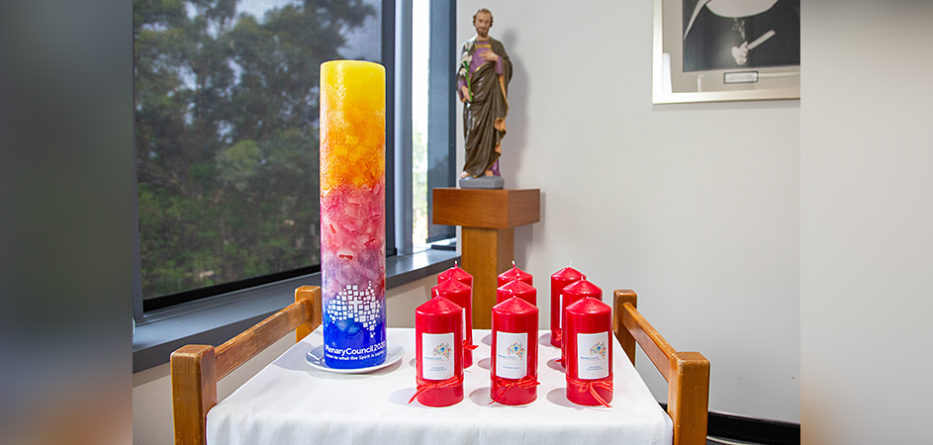Homily for the Votive Mass of the Holy Spirit for the First Assembly of the Fifth Plenary Council of Australia
Readings: Deuteronomy 30:10-14; Psalm 18: 8-11; Philippians 2:1-4; Mark 6:30-34
3 October 2021
Tomorrow afternoon, Catholics from all around Australia will sit at their computers and join the Zoom mass being celebrated in Perth to mark the commencement of the First Assembly of the Fifth Plenary Council of Australia. We have been urged to listen to what the Spirit is saying. We are called “to develop concrete proposals to create a more missionary, Christ-centred Church in Australia at this time”.
A plenary council established under the church’s canon law restricts the deliberative voting power to the bishops. But this plenary council will include 280 people, many of whom are not bishops or priests. Their voices will be heard, but in the end, their votes don’t ultimately count unless they are bishops.
LISTEN: https://soundcloud.com/frank-brennan-6/opening-mass-plenary-council
When the plenary processes started, I gave a number of talks suggesting that we needed a two phase process: first a broad based democratic assembly of the People of God allowing issues of concern to be raised, and second a plenary council with all the usual canonical constraints on who can and cannot have a deliberative vote. Conceding that bishops are the ultimate decision makers, I thought the bishops should make legislative decisions but only about matters raised by the People of God, and presumably in sympathy with the concerns raised by the People of God.[1] That idea did not win much appeal and I had little more to say about the processes of the plenary council.
Then out of the blue about a month ago, I received a letter from Archbishop Tim Costelloe SDB asking me to be a peritus, an expert adviser to the plenary council. I was asked to contribute my gifts “to shaping the focus of mission for the future of the Church in Australia, listening and responding to the whisper of the Holy Spirit as the fruits of discernment are revealed”.
I happily accepted but thought I should go and make a retreat before participating. Why? Because I was afraid that the Spirit might not get much of a look-in during the course of the Plenary Council, or at least, that I might not be attentive to the movement of the Spirit, let alone the slightest whisper of the Holy Spirit. I had found myself becoming disheartened as I heard various groups putting their case for church reform. To me it sounded all a bit too much like factional politics, with the players staking out their claims before the match got underway.
When living in Canberra until two years ago, I had got to know some very fine Catholics who were worried about the state of our Church, wondering how the faith might be handed on credibly to their children and grandchildren. I was shocked to read Cardinal George Pell’s Prison Journal in which he wrote: “I can understand the Wagga farmer at a meeting to prepare for the Plenary Council, which was led by Renewal enthusiasts from Canberra, who walked out proclaiming, ‘It’s OK if you want a new church. Go off and do it, but don’t come down here upsetting our church.’” Cardinal Pell wrote, “This isn’t an option for me, even at my age, but the potential for strife and further damage is real with the Plenary Council.”[2]
Cardinal Pell has been fond of saying that we have a choice of living under the Apostolic Tradition or being masters of that Tradition. He seems to suggest that we cannot do both. Earlier in his Prison Journal, Pell lamented that if the Catholics for Renewal group were “to carry the day at the Australian Plenary Council, which is highly unlikely, they would accelerate the exodus because they believe they can improve the apostolic tradition. When tried, that has never worked.”[3] But to be true to the Tradition we have to be attentive to the situation in which we find ourselves and ask how best to express and live out that Tradition in our changed circumstances. I have grown fond of Cardinal (now Saint) John Henry Newman’s saying: “To live is to change, and to be perfect is to have changed often.” If that goes for us as individuals, I presume it goes for us as the People of God. God knows, we have lived through a lot of profound change as the People of God in Australia since the last Plenary Council in 1937. And the royal commission highlighted a lot of changes which we needed to make as Church if we were to be credible in the modern age discharging the most basic trust including the protection of children.
On my retreat, I read an article by Jesuit Brian O’Leary making the point that in this time of postmodernism, there’s no longer any possibility of a metanarrative, an overarching story, myth or belief system that’s capable of giving meaning to all the dimensions of our human lives. But O’Leary goes on to emphasise the added importance of interiority by which he means everything that has to do with the sphere of the heart, of deep intentionality, of decisions made from within. All of us know that great saying of Socrates: “The unreflected life is not worth living.” O’Leary suggests that we might add that the life without prayer is not worth living.[4]
Over these days, we need to pray together. We need to attend to matters of the heart. As John Henry Newman would say, heart needs to speak to heart. On Friday, we celebrated the Feast of Thérèse of Lisieux, the Little Flower. She joined the Carmelites at just 15 and was dead at 24, proclaimed by John Paul II as a Doctor of the Church. I had never previously drawn much fruit from her writings. But preparing for the Plenary Council, I was very struck by her reflection on Paul’s First Letter to the Corinthians when he speaks about various offices and functions in the church community. Thérèse could not identify herself in any of the roles described by Paul but was encouraged by this theme: Set your desires on the greater gifts. And I will show you the way which surpasses all others. She wrote: “For the Apostle insists that the greater gifts are nothing at all without love and that this same love is surely the best path leading directly to God. At length I had found peace of mind.”
The Little Flower came to this realisation: “I knew that the Church had a heart and that such a heart appeared to be aflame with love. I knew that one love drove the members of the Church to action, that if this love were extinguished, the apostles would have proclaimed the Gospel no longer, the martyrs would have shed their blood no more. I saw and realized that love sets off the bounds of all vocations, that love is everything, that this same love embraces every time and every place. In one word, that love is everlasting.” She declared to Jesus: “I have found my calling: my call is love. Certainly I have found my place in the Church.”[5]
Let’s hope and pray that we can respond to each other in love during the course of this plenary council. But doing so, we acknowledge that we are all sinners, and we all act out of a mixture of motives, whether we are bishops with deliberative votes or members with no ultimate say in the outcome.
Concluding my retreat, I obtained a freshly published copy of my sister Bernadette’s biography of the deceased Australian writer Gillian Mears with the evocative title Leaping into Waterfalls. I’ve not read much of Mears’ work and neither am I likely to. There’s a lot about her personality and the life she lived which I find unattractive. My sister Bernadette writes: “Gillian Mears often likened herself to a Clarence Valley butcherbird, a creature filled with beautiful song who could also pick out the eyes of fledglings. Riven with contradictions, at times she wished that she really was the innocent country girl many people perceived her to be, yet as a writer she relished her dark secrets and transgressive desires; they fuelled her pen.”[6] All of us have our complexities and our deficiencies; we also have our moments of transparent grace when love triumphs.
Mears was not a religious person. There is no way she would ever have been a member of a church plenary council. When her body was wracked with multiple sclerosis in her 40’s, she looked up hill and down dale for cures and relief. It got to the stage that “while Mears had given up on the idea of miracles, she was not quite finished with blessings.”[7] Mears wrote: “I want to touch life like the green twig touches the river…I want to touch life forever aware of the huge river of God in me, whose headwaters are my heart.”[8] As she approached death, she described her “vision of the dance of the end of my life, with all those ever hurt by me and who have hurt me, joined in the most wild, joy filled dance, streaming over the soft land, smiles and forgiveness wreathing our faces.”[9]
Coming through the child sexual abuse crisis, the body of our Church is wracked with pain and illness. We might not be expecting miracles during these days of meeting, but we should confidently await blessings, and pray for blessings in abundance. How good it would be if all the People of God could hear a message of hope. Together, the Wagga farmer and “the Renewal enthusiasts from Canberra” might “develop concrete proposals to create a more missionary, Christ-centred Church in Australia at this time”, graciously living under the Apostolic Tradition of which we the People of God are masters being led by the one who describes himself as the servant of the servants of God.
How good it would be if all of us participating in the plenary council could sing and dance with all those we have ever hurt and with all those who have hurt us, “streaming over the soft land, smiles and forgiveness wreathing our faces.” As Paul put it to the Philippians: “Be united in your convictions and united in your love, with a common purpose and a common mind” with no competition among you and no conceit. As Moses said to the people, “the Word is very near to you, it is in your mouth and in your heart for your observance”. Jesus bequeaths his peace to us – a peace the world cannot give. So do not let our hearts be troubled or afraid.
Let us pray:
Come, Holy Spirit of the great South Land.
O God, bless and unite all your people in Australia
and guide us on the pilgrim way of the Plenary Council.
Give us the grace to see your face in one another
and to recognise Jesus, our companion on the road.
Give us the courage to tell our stories and to speak boldly of your truth.
Give us ears to listen humbly to each other
and a discerning heart to hear what you are saying.
Lead your Church into a hope-filled future,
that we may live the joy of the Gospel.
Through Jesus Christ our Lord,
bread for the journey from age to age.
Amen.
Fr Frank Brennan SJ is the Rector of Newman College, Melbourne, and the former CEO of Catholic Social Services Australia (CSSA). He has been appointed a peritus at the Fifth Plenary Council of the Australian Catholic Church.
[1] See for example ‘Seeking a plenary council fit for purpose’ Eureka Street, 14 November 2018, available at https://www.eurekastreet.com.au/article/seeking-a-plenary-council-fit-for-purpose
[2] George Pell, Prison Journal, Volume 3, 5 December 2019.
[3] George Pell, Prison Journal, Volume 2, Ignatius Press, 2021, 11 November 2019, p.275.
[4] Brian O’Leary, ‘Ignatian Mysticism and Contemporary Culture’, The Way, Volume 52, No. 4, October 2013, pp. 44-56
[5] St Therese of the Child Jesus, Manuscrit Autobiographiques, Lisieux, 1957, 227-229
[6] Bernadette Brennan, Leaping into Waterfalls: The Enigmatic Gillian Mears, Allen & Unwin, 2021, p. ix
[7] Ibid, p. 290
[8] Ibid, p. 295
[9] Ibid, p. 299








